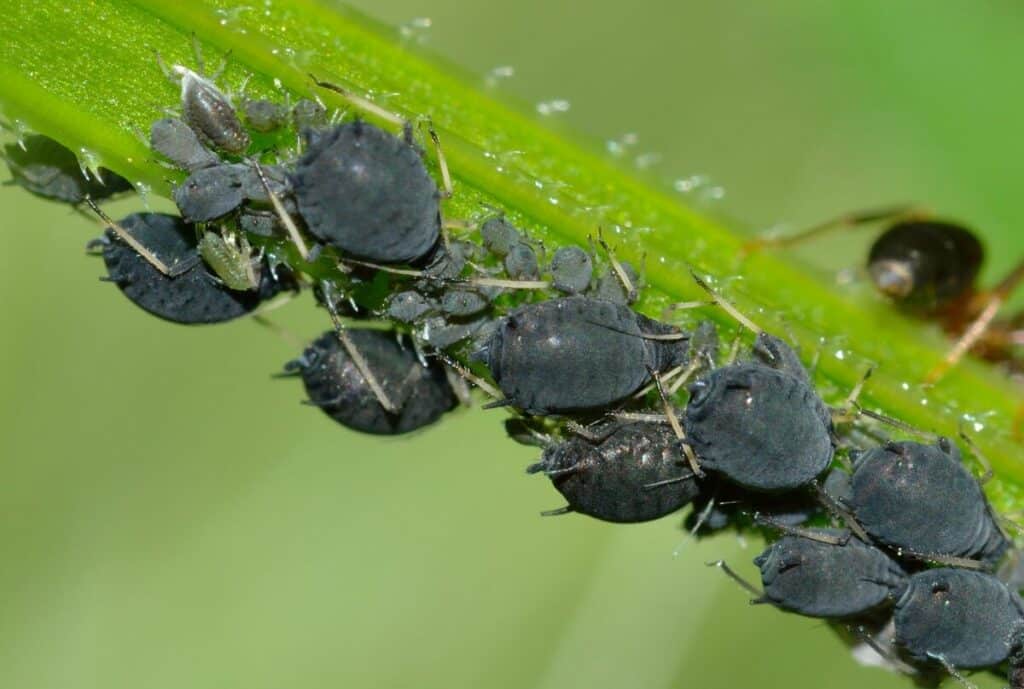Aphids are probably one of the common pests you’ll find on vegetable plants you grow. They are a nuisance because they multiply rapidly and cause serious damage to the plants.
If you’ve ever dealt with aphids in your garden, you know the frustration they can cause. These tiny insects are common pests that feed on the sap of plants, causing damage and stunting growth.
In this article, you’ll find comprehensive information on aphids and how to deal with them.
What are aphids?
Aphids are small, soft-bodied insects that feed on plant sap. You’ll find them in different colors such as green, brown, black, white, pink, or yellow.
Aphids reproduce quickly, with females giving birth to live young with no mating. These pests suck sap from leaves, which can cause stunted growth, wilting, and mold or fungus to grow.
What damage do aphids cause on plants?
Aphids suck sap from the leaves of plants. When aphids are abundant, they can damage the leaves and cause them to yellow or wilt.. Look for distorted or curled leaves, stunted growth, and discoloration.
How to identify aphids on plants

Aphids are tiny insects, so you may need to check carefully on the leaves. I found them nesting under the leaves with aphids and their nymphs. You’ll find these small bugs that are green, white, yellow, orange, brown, or black.
A common sign of aphids is stick residue called honeydew that is deposited on the leaves by aphids. You’ll also find ants in your plants as they collect this honeydew. The ants will farm and protect aphids from other insects.
Read more:
How to get rid of aphids
Insecticidal Soap: This solution kills aphids by suffocating them and disrupting their cell membranes. You can safely use it on most plants and apply it directly to the affected areas.
Neem oil: This repels aphids and affects their feeding, growth, and reproduction. You should apply it as a spray and reapply it every 7-14 days for best results.
Ladybugs or lacewings: You can introduce ladybugs or lacewings into the garden to control infestations as these beneficial insects feed on aphids. They’re a natural and eco-friendly solution.
Read more:
- How To Make Neem Oil Spray For Plants
- Insecticidal Soap vs Dish Soap for Pest Control
- 7 Ways To Get Rid of Life-sucking Aphids That Turn Your Plants Into A Zombie
How to prevent aphids on plants
I don’t think there are any effective methods to prevent aphids on plants. It’s natural you’ll find these pests on some of your vegetable plants at some point.
My advice is to monitor your plants every day. It helps to know immediately when aphids attack the plants so you can take the action to get rid of them.
Host vegetable plants for aphids
Aphids will attack most of the vegetable plants. I’ve found them on my tomato and pepper plants. But we can find them on any plant in the garden as they suck sap from the leaves.
Natural predators of aphids
Ladybugs and lacewings are natural predators of aphids that can help control their populations in your garden..
You can attract them to your garden with a diverse range of plants, so planting a variety of flowers and herbs can help attract and maintain their presence.
References
- https://en.wikipedia.org/wiki/Aphid
- https://extension.umn.edu/yard-and-garden-insects/aphids
- https://ipm.ucanr.edu/PMG/PESTNOTES/pn7404.html

Fact Checked, Written, and Published by Kevin Rodrigues
Kevin is the founder of Gardening Mentor, a website that aims to teach people to grow their own food in a limited space. As a self-taught gardener, Kevin has spent several years growing plants and creating gardening content on the website. He is certified in Home Horticulture and Organic Gardening from Oregon State University. He has a Post Graduate Diploma in Horticulture and Landscape Gardening from Mumbai University.
Read more
